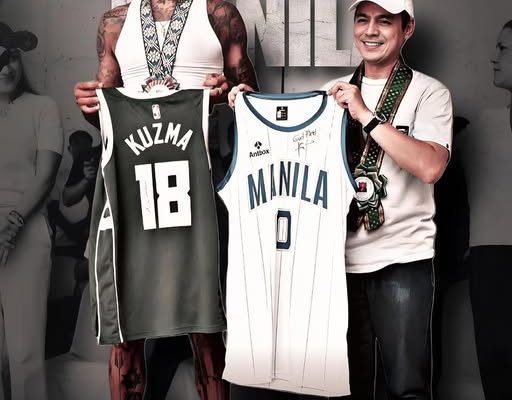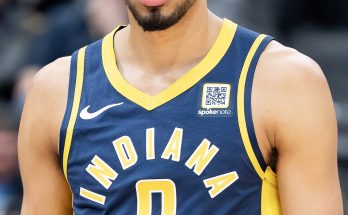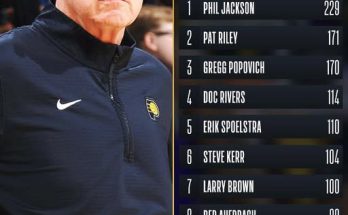NBA star Kyle Kuzma has always been known as more than just a basketball player. While his name first rang loudly across the NBA during his breakout years with the Los Angeles Lakers, where his scoring ability, youthful energy, and confidence on the court turned him into a rising star, his story has never been confined strictly to basketball. Kuzma has built a reputation for fashion, culture, and international engagement, often extending his influence well beyond the hardwood. This was further exemplified in a symbolic and memorable gesture when he swapped his signed Milwaukee Bucks jersey with Isko Domagoso Moreno, the Mayor of Manila, the bustling capital of the Philippines. That exchange carried meaning not just as a sports story, but as a moment that blended culture, politics, international connection, and the global reach of basketball.
Kuzma’s journey to this moment is worth understanding. Born in Flint, Michigan, he came from a city known for its struggles and resilience. Making it to the NBA represented not just personal triumph, but also a narrative of perseverance against odds. He developed into a skilled forward who could score in bunches, handle the ball for his size, and fit into multiple roles depending on his team’s needs. His move from the Lakers to the Washington Wizards opened another chapter in his career, but even when trades brought him later to Milwaukee, what remained consistent was his ability to connect with fans and communities. Players in the modern NBA are often viewed as ambassadors of the sport, representing not only their teams and cities but also the league’s worldwide influence. Kuzma has leaned into that identity, embracing opportunities to engage with fans across the globe, and in the Philippines, that opportunity took on unique weight.
Basketball is not merely a sport in the Philippines. It is woven deeply into the country’s social fabric. The game is played everywhere, from rural towns to urban centers, often with makeshift courts and hoops nailed onto posts. The NBA, in particular, commands almost unmatched devotion among Filipino fans, who cheer for their favorite stars with unrivaled passion. This makes any visit or acknowledgment from an NBA player deeply meaningful to the people there. Kuzma’s jersey swap with Mayor Moreno became not only a show of mutual respect but also a powerful symbol of how basketball bridges cultural divides.
Mayor Isko Moreno himself is a figure whose story resonates with many Filipinos. Rising from humble beginnings as a scavenger before entering entertainment and later politics, he built his career on resilience and relatability. His leadership of Manila has been marked by modernization efforts and attempts to transform the capital into a more globally recognized city. For someone like Moreno, receiving a signed jersey from an NBA star is not just about sports memorabilia; it is about recognition of Manila’s connection to the global community, a reminder that the city and its people hold a special place in the eyes of international figures.
The jersey swap itself may appear on the surface as a casual act, but sports gestures like these often hold layers of meaning. For Kuzma, handing over his Bucks jersey with his signature symbolized goodwill and appreciation toward the people of Manila and their leadership. For Mayor Moreno, accepting the jersey was not just about honoring an athlete, but about celebrating the city’s relationship with basketball and its role on the international stage. In that moment, two figures from very different worlds—one from American professional sports, the other from Filipino politics—found common ground through the global language of basketball.
The significance also lies in the timing and location. Manila has been a central hub for basketball in Asia, with the Philippines hosting various international tournaments, FIBA events, and NBA exhibition games. Fans in the country track NBA seasons passionately, often waking up early in the morning to watch games live. Kuzma’s gesture reinforced the NBA’s commitment to its Filipino audience. Over the years, stars like Kobe Bryant, LeBron James, Stephen Curry, and James Harden have traveled to Manila, drawing massive crowds of adoring fans. Kuzma’s jersey exchange became part of that tradition, a passing of the torch in ensuring that the NBA’s bond with the Philippines remains strong.
On a broader scale, sports diplomacy has long played a role in fostering international goodwill. When American basketball stars extend their influence abroad, they act as informal ambassadors of culture. Unlike traditional politics, which often carries complexities and divides, sports can unify across borders. Kuzma did not need to give a speech on diplomacy or sign any formal agreements. By exchanging his jersey with Mayor Moreno, he effectively underscored the shared humanity and passion that basketball evokes in both the United States and the Philippines. The NBA has made deliberate efforts to highlight such connections, but it takes players willing to step into that role for the gestures to feel authentic. Kuzma’s act showed that he values that role, that he understands the reach of his platform, and that he is willing to use it positively.
For Filipino fans, this exchange will likely be remembered not simply because of who Kuzma is, but because of what it represents. The jersey itself becomes a piece of history, a physical artifact that ties Manila to the NBA. In time, such items may be displayed publicly, reminding citizens of the city’s global links. For young athletes in the Philippines, seeing one of their leaders receive such recognition may serve as motivation, showing that basketball continues to serve as a bridge between their country and the world. It also underscores the possibility of dreams, where a child playing streetball in Manila might imagine themselves one day stepping into the same conversations, being part of the same connections that bind communities together through sport.
From Kuzma’s perspective, the act also contributes to his personal legacy. Athletes are often remembered not just for what they did on the court, but for the ways they touched lives off it. Players like Kobe Bryant left indelible marks in the Philippines not only because of championships and highlights but because they embraced the fans’ devotion. Kuzma, though not at the same legendary level, has shown awareness that his name and presence can have meaningful impact. By offering something as personal as a signed jersey, he creates a lasting bond, ensuring that when Filipino fans think of NBA players who respected them, his name will be among them.



